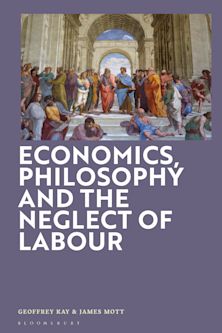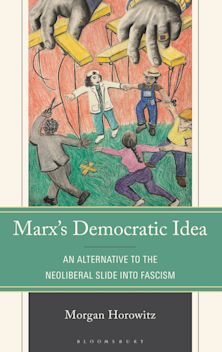- Home
- ACADEMIC
- Philosophy
- Social and Political Philosophy
- Fanon and the Decolonization of Philosophy
Fanon and the Decolonization of Philosophy
Elizabeth A. Hoppe (Anthology Editor) , Tracey Nicholls (Anthology Editor) , Anna Carastathis (Contributor) , Nigel C. Gibson (Contributor) , Lewis R. Gordon (Contributor) , Peter Gratton (Contributor) , Ferit Güven (Contributor) , Mireille Fanon Mendès-France (Contributor) , Marilyn Nissim-Sabat (Contributor) , Olúfémi Táíwò (Contributor) , Mohammad H. Tamdgidi (Contributor) , Chloë Taylor (Contributor) , Sokthan Yeng (Contributor) , Mireille Fanon-Mendès France (Foreword)
Fanon and the Decolonization of Philosophy
Elizabeth A. Hoppe (Anthology Editor) , Tracey Nicholls (Anthology Editor) , Anna Carastathis (Contributor) , Nigel C. Gibson (Contributor) , Lewis R. Gordon (Contributor) , Peter Gratton (Contributor) , Ferit Güven (Contributor) , Mireille Fanon Mendès-France (Contributor) , Marilyn Nissim-Sabat (Contributor) , Olúfémi Táíwò (Contributor) , Mohammad H. Tamdgidi (Contributor) , Chloë Taylor (Contributor) , Sokthan Yeng (Contributor) , Mireille Fanon-Mendès France (Foreword)
You must sign in to add this item to your wishlist. Please sign in or create an account
Description
Fanon and the Decolonization of Philosophy explores the range of ways in which Frantz Fanon's decolonization theory can reveal new answers to perennial philosophical questions and new paths to social justice. The aim is to show not just that Fanon's thought remains philosophically relevant, but that it is relevant to an even wider range of philosophical issues than has previously been realized. The essays in this book are written by both renowned Fanon scholars and new scholars who are emerging as experts in aspects of Fanonian thought as diverse as humanistic psychiatry, the colonial roots of racial violence and marginalization, and decolonizing possibilities in law, academia, and tourism. In addition to examining philosophical concerns that arise from political decolonization movements, many of the essays turn to the discipline of philosophy itself and take up the challenge of suggesting ways that philosophy might liberate itself from colonial-and colonizing-assumptions.
This collection will be useful to those interested in political theory, feminist theory, existentialism, phenomenology, Africana studies, and Caribbean philosophy. Its Fanon-inspired vision of social justice is endorsed in the foreword by his daughter, Mireille Fanon-Mendès France, a noted human rights defender in the French-speaking world.
Table of Contents
Chapter 2 Introduction
Part 3 I: ON KNOWLEDGE AND THE ACADEMY
Chapter 4 1: Fanon on Decolonizing Knowledge
Chapter 5 2: Opening up the Academy: Fanon's Lessons for Inclusive Scholarship
Part 6 ON FANON AND PSYCHIATRY
Chapter 7 3: Fanonian Musings: Decolonizing/Philosophy/Psychiatry
Chapter 8 4. Fanon, Foucault, and the Politics of Psychiatry
Part 9 III: ON FANON AND VIOLENCE
Chapter 10 5: Fanon on Turtle Island: Revisiting the Question of Violence
Chapter 11 6: Sovereign Violence, Racial Violence
Part 12 IV: FANON ON RACISM AND SEXUALITY
Chapter 13 8: Fanon and the Impossibilities of Love in the Colonial Order
Part 15 V: BEYOND COLONIZATION
Chapter 15 7: Decolonizing Selves: The Subtler Violences of Colonialism and Racism in Fanon, Said, and Anzaldúa
Chapter 16 9: Hegel, Fanon, and the Problem of Negativity in the Postcolonial
Chapter 17 10: Tourism as Racism: Fanon and the Vestiges of Colonialism
Part 18 VI: BEYOND FANON
Chapter 19 11: Amilcar Cabral: A Philosophical Profile
Chapter 20 12: Fanonian Presences in South Africa: From Theory and from Practice
Chapter 21 Suggestions for Further Reading
Product details
| Published | 08 Mar 2010 |
|---|---|
| Format | Ebook (Epub & Mobi) |
| Edition | 1st |
| Extent | 298 |
| ISBN | 9780739141274 |
| Imprint | Lexington Books |
| Publisher | Bloomsbury Publishing |
About the contributors
Reviews
-
Elizabeth A. Hoppe and Tracey Nicholls' impressive and welcome collection of essays is invaluable reading for those anxious to evaluate and counter the juggernaut of neo-liberalism that is transforming human possibility through the shaping of human and capital flows. In addition, their collection opens new ways for us to consider the myriad ways in which Fanon-psychiatrist, philosopher, revolutionary-affects our thinking about ethically oriented human transformation toward being actional in our neo-liberal moment. Their fascinating, brilliant, and valuable collection explores wide-ranging topics responsible to a refreshingly generous orientation.
D. Moore, DePaul University
-
Fanon, unbowed and rebellious, fought tenaciously and victoriously against the supremacy exerted by the powerful over the weak....This volume brings together twelve contributors wanting to illuminate, forty-nine years after his death, how Fanon thought and acted, the ways his thinking is still pertinent to our knowledge of the places he affected, and the ways his thinking confronts the experiences, problems, and issues of the present.
Mireille Fanon-Mendès France, from the foreword
-
If what we call 'philosophy' is to rise to the task of decolonizing itself, it must take stock first of its erasures, then of the critical tools still available to it-many of them coming from beyond the 'tradition.' This important volume answers both these imperatives. It offers us a return to Fanon's thought at a crucial time when globalization and neo-liberalism have reshaped older colonial patterns of international disempowerment and poverty. In so doing, it shows the pertinence-in fact, the indispensability-of Fanon in our time. Faithful to the collection's goal, the contributors address each dimension of Fanon's work, then apply theory to practice, analyzing contemporary political and economic dilemmas-in a specifically and creatively Fanonian vein.
Bettina G. Bergo, Université de Montréal



































